ALEXANDER III the GREAT 330BC Silver Greek Tetradrachm Coin & MEDALLION i61748
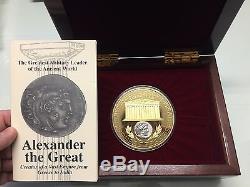

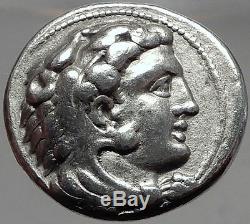
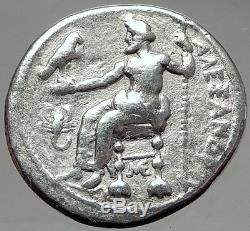
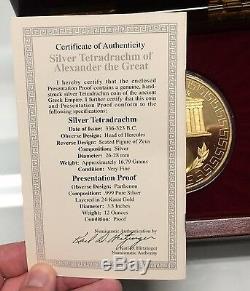
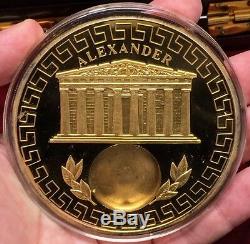
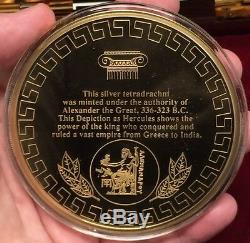
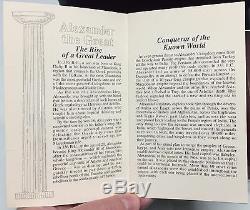


Greek Coin of Macedonian Kingdom Alexander III the Great - King of Macedonia: 336-323 B. LIFETIME ISSUE Silver Tetradrachm 25mm (16.42 grams) Myriandros or Issos mint. Struck under Menes or Philotas, circa 330-325 B. Reference: Price 3218; Newell, Myriandros 18 Head of Alexander the Great as Hercules right, wearing the lion-skin headdress.
AEANOY, Zeus Aetophoros seated left, holding eagle and scepter; scorpion in field to left; ME monogram below throne. Comes in wooden box, with a huge 12 ounce.
999 fine gold-plated proof silver medallion (with notch to put the ancient coin into) and historical booklet exactly as seen in the pictures. This is likely the most elaborate presentation for an Alexander the Great coin ever created! Best known as Alexander the Great , he was a king (basileus in Greek) of the Ancient Greek kingdom of Macedonia. He was born in the city of Pella in 356 BC.
By age 20, Alexander succeeded his father Philip II to the throne as king. He spent most of his years as king in an unprecedented military campaign of conquest through Asia, northeast Africa and even reached India. By age 30 he created one of the biggest empires in the ancient world, reaching from Greece to northwestern India. Being undefeated in battle, many consider him as one of history's most successful military commanders. He could be considered one of history's most important figures, having spread the Greek civilization far and wide, and was even admired by Julius Caesar along with many other important historical personages as well.The Greatest Military Commander of Ancient Times. Creator of an Empire stretching from Greece to India. Alexander, surnamed the Great, son of king Philip II and Olympias, was born at Pella, B.
His early education was committed to Leonidas and Lysimachos ; and he was also placed under the care of the great philosopher Aristotle, who acquired an influence over his mind and character, which was manifest to the latest period of his life. At the age of 16 Alexander was entrusted with the government of Macedonia by his father, while he was obliged to leave his kingdom to march against Byzantium. He first distinguished himself, however, at the battle of Chaeronea (338), where the victory was mainly owing to his impetuosity and courage. On the murder of his father, Philip II in 336 B. Alexander ascended the throne, at the age of 20, and found himself surrounded by enemies on every side. He first put down rebellion in his own kingdom, and then rapidly marched into Greece. His unexpected activity overawed all opposition; Thebes, which had been most active against him, submitted when he appeared at its gates ; and the assembled Greeks at the Isthmus of Corinth, with the sole exception of the Lacedaemonians (Spartans), elected him to the command against Persia, which had previously been bestowed upon his father. He now directed his arms against the barbarians of the north, marched (early in 335) across mount Haemus, defeated the Triballi, and advanced as far as the Danube, which he crossed ; and on his return subdued the Illyrians and Taulantii. A report of his death having reached Greece, the Thebans once more took up arms.But a terrible punishment awaited them. Alexander now prepared for his great expedition against Persia.
In the spring of 334, he crossed the Hellespont, with about 35,000 men. Of these 30,000 were foot and 5000 horse ; and of the former only 12,000 were Macedonians. Alexander's first engagement with the Persians was on the river Granicus in Mysia (May 334), where they were entirely defeated by him. This battle was followed by the capture or submission of the chief towns on the W. Halicarnassus was not taken till late in the autumn, after a vigorous defense by Memnon, the ablest general of Darius, and whose death in the following year (333) relieved Alexander from a formidable opponent.
He now marched along the coast of Lycia and Pamphylia, and then N. Into Phrygia and to Gordium, where he cut or untied the celebrated Gordian knot, which, it was said, was to be loosened only by the conqueror of Asia. In 333, he marched from Gordium through the centre of Asia Minor into Cilicia, where he nearly lost his life at Tarsus by a fever, brought on by his great exertions, or through throwing himself, when heated, into the cold waters of the Cydnus. Darius meantime had collected an army of 500,000 or 600,000 men, with 30,000 Greek mercenaries, whom Alexander defeated in the narrow plain of Issus. Darius escaped across the Euphrates by the ford of Thapsacus; but his mother, wife, and children fell into the hands of Alexander, who treated them with the utmost delicacy and respect.Alexander now directed his arms against the cities of Phoenicia, most of which submitted ; but Tyre was not taken till the middle of 332, after an obstinate defense of seven months. Next followed the siege of Gaza, which again delayed Alexander two months.
Afterwards, according to Josephus, he marched to Jerusalem, intending to punish the people for refusing to assist him, but he was diverted from his purpose by the appearance of the high priest, and pardoned the people. This story is not mentioned by Arrian, and rests on questionable evidence. Alexander next marched into Egypt, which willingly submitted to him, for the Egyptians had ever hated the Persians. At the beginning of 331, Alexander founded at the mouth of the W. Branch of the Nile, the city of Alexandria, and about the same time visited the temple of Jupiter Ammon, in the desert of Libya, and was saluted by the priests as the son of Jupiter Ammon.In the spring of the same year (331), Alexander set out to meet Darius, who had collected another army. He marched through Phoenicia and Syria to the Euphrates, which he crossed at the ford of Thapsacus ; thence he proceeded through Mesopotamia, crossed the Tigris, and at length met with the immense hosts of Darius, said to have amounted to more than a million of men, in the plains of Gaugamela. The battle was fought in the month of October, 331, and ended in the complete defeat of the Persians. Alexander pursued the fugitives to Arbela (Erbil), which place has given its name to the battle, though distant about 50 miles from the spot where it was fought.
Darius, who had left the field of battle early in the day, fled to Ecbatana (Hamadan), in Media. From Arbela he marched to Babylon, Susa, and Persepolis, all of which surrendered to him.
He is said to have set fire to the palace of Persepolis, and, according to some accounts, in the revelry of a banquet, at the instigation of Thais, an Athenian courtesan. At the beginning of 330 Alexander marched from Persepolis into Media, in pursuit of Darius, whom he followed through Rhagae and the passes of the Elburz mountains, called by the ancients the Caspian Gates, into the deserts of Parthia, where the unfortunate king was murdered by Bessus, satrap of Bactria, and his associates. Alexander sent his body to Persepolis, to be buried in the tombs of the Persian kings. Bessus escaped to Bactria, and assumed the title of king of Persia. Alexander was engaged during the remainder of the year in subduing the N.
Provinces of Asia between the Caspian and the Indus, namely, Hyrcania, Parthia, Aria, the Drangae and Sarangae. It was during this campaign that Philotas, his father Parmenion, and other Macedonians, were executed on the charge of treason. In 329 Alexander crossed the mountains of the Paropamisus (the Hindoo Koosh), and marched into Bactria against Bessus, whom he pursued across the Oxus into Sogdiana.
In this country Bessus was betrayed to him, and was put to death. From the Oxus he advanced as far as the Jaxartes (the Sir), which he crossed, and defeated several Scythian tribes N. It was here that he killed his friend Clitus in a drunken revel.
In 328, Alexander again crossed the Oxus to complete the subjugation of Sogdiana, but was not able to effect it in the year, and accordingly went into winter quarters at Nautaca, a place in the middle of the province. At the beginning of 327, he took a mountain fortress, in which Oxyartes, a Bactrian prince, had deposited his wife and daughters. The beauty of Roxana, one of the latter, captivated the conqueror, and he accordingly made her his wife. This marriage with one of his Eastern subjects was in accordance with the whole of his policy. Having completed the conquest of Sogdiana, he marched S.
Into Bactria, and made preparations for the invasion of India. While in Bactria another conspiracy was discovered for the murder of the king. The plot was formed by Hermolaus with a number of the royal pages, and Callisthenes, a pupil of Aristotle, was involved in it.
All the conspirators were put to death. Alexander did not leave Bactria till late in the spring of 327, and crossed the Indus, probably near the modem Attock.
He met with no resistance till he reached the Hydaspes, where he was opposed by Porus, an Indian king, whom he defeated after a gallant resistance, and took prisoner. Alexander restored to him his kingdom, and treated him with distinguished honor. He founded two towns, one on each bank of the Hydaspes : one called Bucephala, in honor of his horse Bucephalus, who died here, after carrying him through so many victories ; and the other Nicaea, to commemorate his victory. From thence he marched across the Acesines (the Chinab) and the Hydraotes (the Ravee), and penetrated as far as the Hyphasis (Garra). This was the furthest point which he reached, for the Macedonians, worn out by long service, and tired of the war, refused to advance further ; and Alexander, notwithstanding his entreaties and prayers, was obliged to lead them hack.
This was late in the autumn of 327. The people on each side of the river submitted without resistance, except the Malli, in the conquest of one of whose places Alexander was severely wounded. At the confluence of the Acesines and the Indus, Alexander founded a city, and left Philip as satrap, with a considerable body of Greeks. Here he built some fresh ships, and continued his voyage down the Indus, founded a city at Pattala, the apex of the delta of the Indus, and sailed into the Indian ocean, which he reached about the middle of 326.
Nearchus was sent with the fleet to sail along the coast to the Persian gulf [Nearchus] ; and Alexander marched with the rest of his forces through Gedrosia, in which country his army suffered greatly from want of water and provisions. He reached Susa at the beginning of 325. Here he allowed himself and his troops some rest from their labours ; and anxious to form his European and Asiatic subjects into one people, he assigned to about 80 of his generals Asiatic wives, and gave with them rich dowries. He himself took a second wife, Barsine, the eldest daughter of Darius, and according to some accounts, a third, Parysatis, the daughter of Ochus.
About 10,000 Macedonians followed the example of their king and generals, and married Asiatic women. Alexander also enrolled large numbers of Asiatics among his troops, and taught them the Macedonian tactics. He moreover directed his attention to the increase of commerce, and for this purpose had the Euphrates and Tigris made navigable, by removing the artificial obstructions which had been made in the river for the purpose of irrigation.
Alexander, left, and Hephaestion, right. The Macedonians, who were discontented with several of the new arrangements of the king, rose in mutiny against him, which he quelled with some difficulty. Towards the close of the same year (325) he went to Ecbatana, where he lost his great favorite Hephaestion. From Ecbatana he marched to Babylon, subduing in his way the Cossaei, a mountain tribe ; and before he reached Babylon he was met by ambassadors from almost every part of the known world. Alexander entered Babylon in the spring of 324, about a year before his death, notwithstanding the warnings of the Chaldaeans, who predicted evil to him if he entered the city at that time.
He intended to make Babylon the capital of his empire, as the best point of communication between his eastern and western dominions. His schemes were numerous and gigantic. His first object was the conquest of Arabia, which was to be followed, it was said, by the subjugation of Italy, Carthage, and the West. But his views were not confined merely to conquest. He ordered a fleet to be built on the Caspian, in order to explore that sea. He also intended to improve the distribution of waters in the Babylonian plain, and for that purpose sailed down the Euphrates to inspect the canal called Pallacopas. On his return to Babylon he was attacked by a fever, probably brought on by his recent exertions in the marshy districts around Babylon, and aggravated by the quantity of wine he had drunk at a banquet given to his principal officers. He died after an illness of 11 days, in the month of Mayor June B. 323, at the age of 32, after a reign of 12 years and 8 months. He appointed no one as his successor, but just before his death he gave his ring to Perdiccas. Roxana was with child at the time of his death, and afterwards bore a son who is known by the name of Alexander Aegus. 19th century depiction of Alexander's funeral procession based on the description of Diodorus. The history of Alexander forms an important epoch in the history of mankind. Unlike other Asiatic conquerors, his progress was marked by something more than devastation and ruin ; at every step of his course the Greek language and civilization took root and flourished ; and after his death Greek kingdoms were formed in all parts of Asia, which continued to exist for centuries. By his conquests the knowledge of mankind was increased ; the sciences of geography, natural history and others, received vast additions ; and it was through him that a road was opened to India, and that Europeans became acquainted with the products of the remote East. Ilya Zlobin, world-renowned expert numismatist, enthusiast, author and dealer in authentic ancient Greek, ancient Roman, ancient Byzantine, world coins & more. Ilya Zlobin is an independent individual who has a passion for coin collecting, research and understanding the importance of the historical context and significance all coins and objects represent.Send me a message about this and I can update your invoice should you want this method. Getting your order to you, quickly and securely is a top priority and is taken seriously here. Great care is taken in packaging and mailing every item securely and quickly.
What is a certificate of authenticity and what guarantees do you give that the item is authentic? You will be very happy with what you get with the COA; a professional presentation of the coin, with all of the relevant information and a picture of the coin you saw in the listing.Additionally, the coin is inside it's own protective coin flip (holder), with a 2x2 inch description of the coin matching the individual number on the COA. Whether your goal is to collect or give the item as a gift, coins presented like this could be more prized and valued higher than items that were not given such care and attention to. When should I leave feedback? Please don't leave any negative feedbacks, as it happens sometimes that people rush to leave feedback before letting sufficient time for their order to arrive. The matter of fact is that any issues can be resolved, as reputation is most important to me.
My goal is to provide superior products and quality of service. How and where do I learn more about collecting ancient coins?
Visit the "Guide on How to Use My Store" for on an overview about using my store, with additional information and links to all other parts of my store which may include educational information on topics you are looking for. The item "ALEXANDER III the GREAT 330BC Silver Greek Tetradrachm Coin & MEDALLION i61748" is in sale since Thursday, January 31, 2019. This item is in the category "Coins & Paper Money\Coins\ Ancient\Greek (450 BC-100 AD)". The seller is "highrating_lowprice" and is located in Rego Park, New York. This item can be shipped worldwide.
- Culture: Greek
- Coin Type: Ancient
- Denomination: Tetradrachm
- Composition: Silver
- Material: Silver


